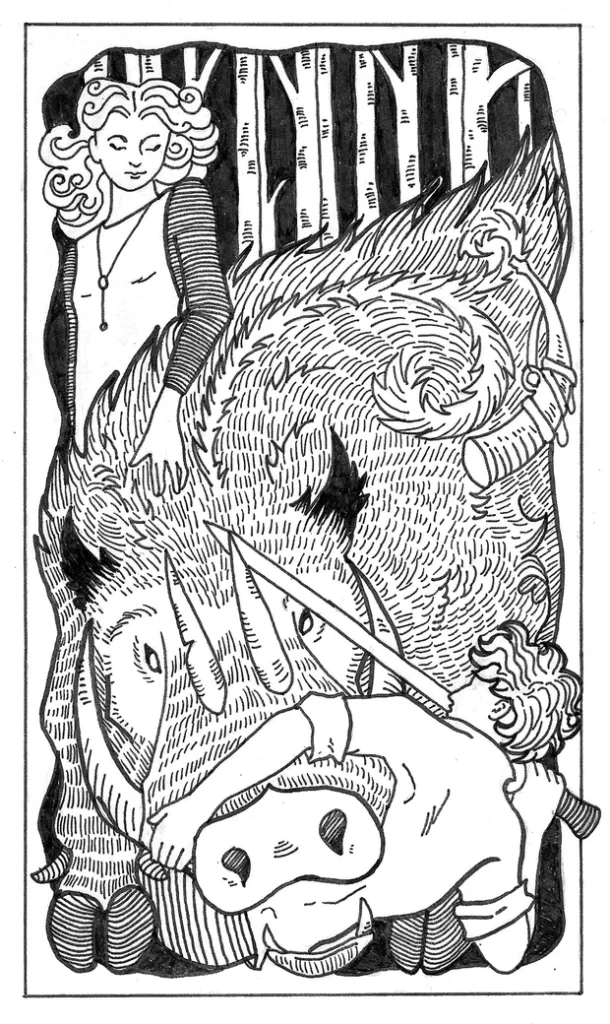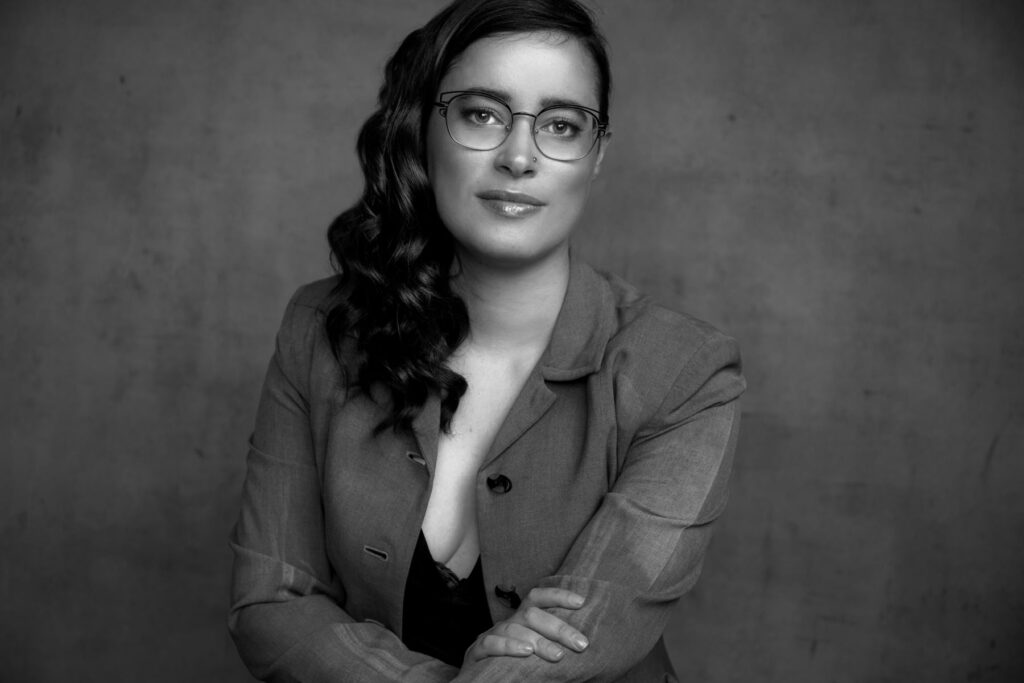Badass Women in Folksong


Badass Women in Folk Song is a four week exploration of songs and ballads about wily and witty women who live fiercely, outwit assailants and use magic to achieve their ends.
Generation after generation of singers have passed down these songs— Now it’s your turn to learn them.
During this course, you will be introduced to traditional songs about badass women and begin to incorporate these songs into your repertoire via live online sessions that teach the songs in an engaging and accessible sing-and-repeat method. Along the way, you’ll learn about the histories, folklore, and real women behind the songs— and become a carrier (and creator!) of these songs yourself.
Enjoy learning and discussing powerful, fierce and funny songs in an inviting community of singers.
“I came to Badass Women in Folksong with limited knowledge of the folk tradition, limited time to commit, and finding myself in a bit of a creative rut. To say I finished the course four weeks later feeling inspired is an understatement! The structure of the course was ideal. Saro was knowledgeable of the tradition, vocal music technique, and was kind and compassionate throughout. I loved the songs, the histories, and imaginative perspectives brought to class discussions. I would absolutely sign up for another course with Saro in the future.”
—Badass Women in Folk Song Student, 2023
How the Course Works
This course starts with a short getting-to-know-you intro class, followed by 4 weeks of learning and content. Each week will focus on a specific theme related to Badass Women in Folk Song (see list below). Participants will be provided with audio lectures and song recordings on the weekly theme, then enjoy a live online session to learn the songs and discuss the week’s topics in greater depth. Participants will also be invited to write their own songs or poems inspired by the course (tools and tips will be provided). During the last week of Badass Women in Folk Song, an additional optional online session will be held for participants to share these new works.
Each week’s content includes:
- Audio recordings of 3-4 ballads and folk songs performed by Saro (these will be learned via sing-and-repeat methods in the weekly live sessions)
- PDF lyrics to each song
- One or more audio lectures that explore the themes, folklore, and history behind the songs. Essay versions of the lectures will also be available.
- A YouTube playlist of traditional songs focused on the week’s theme
- A recording of that week’s live session (posted one to two days after live session takes place)
You will also get:
- A resource list to help you research more traditional songs about badass women in the future
- Access to a private facebook discussion group for attendees to share thoughts and reflections
- In-class vocal warmup and body engagement exercises
You will have access to this material forever!
What We’ll Cover

What to Expect
After Completing the Course, You Will Emerge With
- A fabulous repertoire of ballads and folk songs about women surviving, thriving and kicking ass to use in classrooms, song circles, social justice movements, and performances.
- A knowledge of the many strategies women have used over hundreds of years to assert their rights, survive oppression and claim bodily autonomy— and an understanding of how singing has been a part of this work.
- A foundational experience of learning songs in traditional, unaccompanied singing styles.
- The confidence to create your own songs about badass women using traditional structures and tunes.
- Exercises to help you engage your body as a singer and use song to relieve tension.
Who Should Take This Course?
This course is for teachers, parents, musicians, historians, feminists, organizers, and anyone needing more singing in their life.

This Course Is For You If:
- You’re looking for an infusion of some powerful new feminist songs into your singing repertoire.
- You’re worried about ongoing attacks on the bodily autonomy and rights of many peoples— including women both cisgender and trans, nonbinary people, AFAB folks of any gender and more— and want to use songs to express anger, humor and hope in the face of these struggles.
- As a parent or educator, you want to use song as a fun and creative way to pass on feminist stories to children, youth and young adults.
- As an organizer, facilitator, or religious leader, you’ve been looking for songs to inspire and motivate your community towards feminist-minded social justice work.
- You enjoy using sing and repeat methods of learning.
- You’re open to the malleability of the folk song process. In other words— It’s ok to change lyrics while having a firm understanding of the meaning and intentions of a song in past eras.
- You know that some ballads and folk songs can be long— and you’re ok with that!
- You are affirming of trans, nonbinary and other gender expansive identities and are willing to use people’s pronouns.
- You are aware that racism can show up in historic songs, and are willing to talk about ways to change this language, or consider laying aside songs that can be hurtful to people of color or marginalized communities.
This Course Is Not For You If:
- You’re uncomfortable learning music without sheet music or instrumentation.
- You’re uncomfortable learning or communicating over zoom.
- You do not believe folk song lyrics should be changed ever— under any circumstances!
About The Instructor
Saro Lynch-Thomason (she/her) is an award-winning folksinger, as well as a song leader, folklorist, documentarian, and illustrator, who has studied and taught traditional Appalachian, Southern American, English and Scottish folk songs for nearly 15 years.
Saro was raised in Nashville, Tennessee, and as a young adult began exploring organizing songs from Appalachia (see Saro’s multimedia project on the West Virginia Mine Wars here), and the roots of this music in Anglo-American and African-American song traditions.
She has led community sings and Wassailing choruses, taught at week-long music camps, performed internationally, and produced several albums. She has a special love of using song as a tool to connect contemporary singers to historic and ongoing movements for communal justice and self-liberation.
Her song “More Waters Rising” has become an international anthem in the movement to end climate change, garnering praise in the Huffington Post.
She holds a Masters in Appalachian Studies from ETSU and a Certificate in Documentary Studies from Duke University. Her thesis was about contemporary women singers and how their gendered experiences shaped their repertoire choices.
What Folk Legends Are Saying
“Having been a singer of traditional Appalachian ballads for over 50 years, it’s hard for this old warhorse to get chills when I hear someone sing. But, Saro Lynch-Thomason is the exception. Saro sings with an intensity and intonation that belies her age. There’s something ancient that lives inside Saro’s voice. She sings with heart and soul and people listen. I consider her the singer among singers of her generation.”
“During the course of my more than 50 years as a civil rights, labor and community organizer and musician in Appalachia and the South, I have had the privilege of working with and getting to know some truly amazing artists, activists and scholars. As extraordinary as so many of them are, few are as impressive in all three areas as Saro Lynch-Thomason. She is simply one of the most gifted, creative, committed, conscientious, self-starting, hard-working people I’ve gotten to know over these years.”
Schedule
The Fall 2024 schedule will be announced soon!
About learning over zoom: Learning songs over zoom comes with its own rewards and challenges. As a participant learning songs in the live sessions, you’ll be muted while learning the songs. This means you will be able to hear yourself and Saro— but you will not be able to hear other attendees singing, nor will they hear you (if we were all unmuted, the audio lag time would create a chaotic sound experience!). If this is new for you, check out this sample to get a sense of what the experience will be like. Participants will be able to unmute themselves for general discussion.
Cost and Payment Plans
Cost and payment plans will be updated soon!
Student Testimonials
“I highly recommend Saro’s workshop to anyone who is looking to deeply connect through song and community. The songs she offers are powerful and she is a wonderful teacher and singer. Each song has a story behind it and I loved hearing about the different variations and how they have changed throughout time. It was very healing to sing songs that other humans have also spoken hundreds of years ago!”
“Saro Lynch-Thomason is one of the most insightful and gifted ballad singers of a younger generation. Of course I took her course in ‘Brave Women in Ballads,’ if only to listen to what she had to say and sing. The discussions were provocative, but she welcomed many diverse opinions, and thought about them. I respect that.”.
“Saro sings with an authentic depth that communicates the messages of the material. Her workshops are thoughtful and it was a joy to ‘sing along’ [over zoom] as we learned the ballads.”
